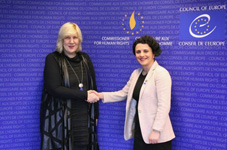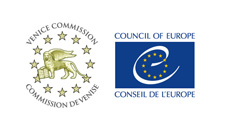
Head of govít administration meets with Venice Commission and CoE representatives
By Nika Gamtsemlidze
Wednesday, February 19
Natia Mezvrishvili, Head of the Georgian Government Administration, met with Council of Europe Commissioner for Human Rights Dunja Mijatovic.
The meeting at the Council of Europe underlined the steps taken recently by the Georgian government to strengthen national human rights mechanisms. They focused on the updated structure and priority areas of the Inter-Agency Human Rights Council. According to Mezvrishvili, under the Prime Minister's leadership, the Council has identified 2020 as priority areas for gender equality, protection of children's rights, implementation of anti-discrimination policies and the rights of persons with disabilities.
The Head of the Government Administration noted that in 2020, the Government of Georgia will begin developing a long-term human rights strategy and, in this process, working with civil society and international organizations to keep them in constant communication is an important task for the Government.
Besides, the meeting focused on the activities of the inspector, personal data protection, law enforcement officials and the crimes committed by them and impartial and effective investigation to ensure the reforms of the Interior Ministry's Human Rights Department is making progress. The parties discussed the effectiveness of human rights protection mechanisms, existing challenges and plans in penitentiary institutions and pre-trial detention facilities.
The Council of Europe Commissioner for Human Rights reiterated readiness to continue working in the format of active cooperation with Georgia.
Mezvrishvili also met with the Secretary of the Venice Commission, Thomas Markert, during her working visit to Strasbourg.
The main purpose of the meeting was to provide representatives of the Venice Commission with information on the achievements of the Criminal Procedure Code of Georgia, reform of investigative and prosecutorial functions and plans.
At the meeting, Mezvrishvili noted that the reform of the Criminal Procedure Code started in parallel with the reform of the criminal police at the Ministry of Internal Affairs and aimed at enhancing the quality of investigations by separating investigative and prosecutorial powers at the legislative level.
According to the head of the government administration, to ensure the effectiveness of the criminal justice process, balancing investigative and prosecutorial powers is one of the key principles of democratic and rule-of-law state governance.
The Venice Commission prepared its conclusion on the concept of reform of the Code of Criminal Procedure in March 2019.
The meeting was attended by Deputy Minister of Internal Affairs Nino Tsatsiashvili, Prime Minister's Advisor on Human Rights and Gender Equality Lela Akiashvili and a representative of the Ministry of Justice.


